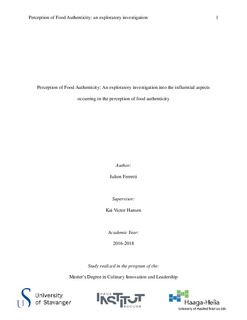Perception of Food Authenticity: An exploratory investigation into the influential aspects occurring in the perception of food authenticity
Master thesis
Submitted version

View/
Date
2018-06Metadata
Show full item recordCollections
- Studentoppgaver (SV-NHS) [618]
Abstract
Abstract
Described as “the key to the development of the modern world” by MacCannell (1976) in his research about tourism behaviour, authenticity has gained importance in managerial strategies for compagnies. However, a reliable model on authenticity has not been clearly defined yet. Understanding how authenticity is ruled becomes the key to high managerial value.
This study is based on three level of analysis: An overview of the theories on authenticity, a literature review of food authenticity and a qualitative study aiming to understand individual's perception. The unique influential aspect that occurs in the perception of authenticity has been identified as the positioning of the individual that sees it. This positioning is related to the level of knowledge that an individual has in a specific context and the self-referential identification defined by appreciation and goals. Three major concepts of authenticity have been highlighted: Pure, approximate and moral. Authenticity being the reality seen through the vision of an individual, these three concepts represent different levels of importance given from an individual to the actual reality. Focusing the study to the context of food permitted to specify these constructs. Knowledge is reattached to the identification of natural purity and to the identification of social constructed standards. Appreciation is linked to the sensorial characteristics of a food item and the surrounding environment where this food experience happens. Goal dependence is divided in four major purposes that an individual search in the consumption of food: sought for nature, sought for health and nutrition, sought for social bounding and sought for nostalgic "reality". These aspects have been identified by individuals in the different interpretation of authenticity. Further quantitative studies need to be conducted in order to see more evidence of the identified constructs.
Description
Master's thesis in Culinary Leadership and Innovation